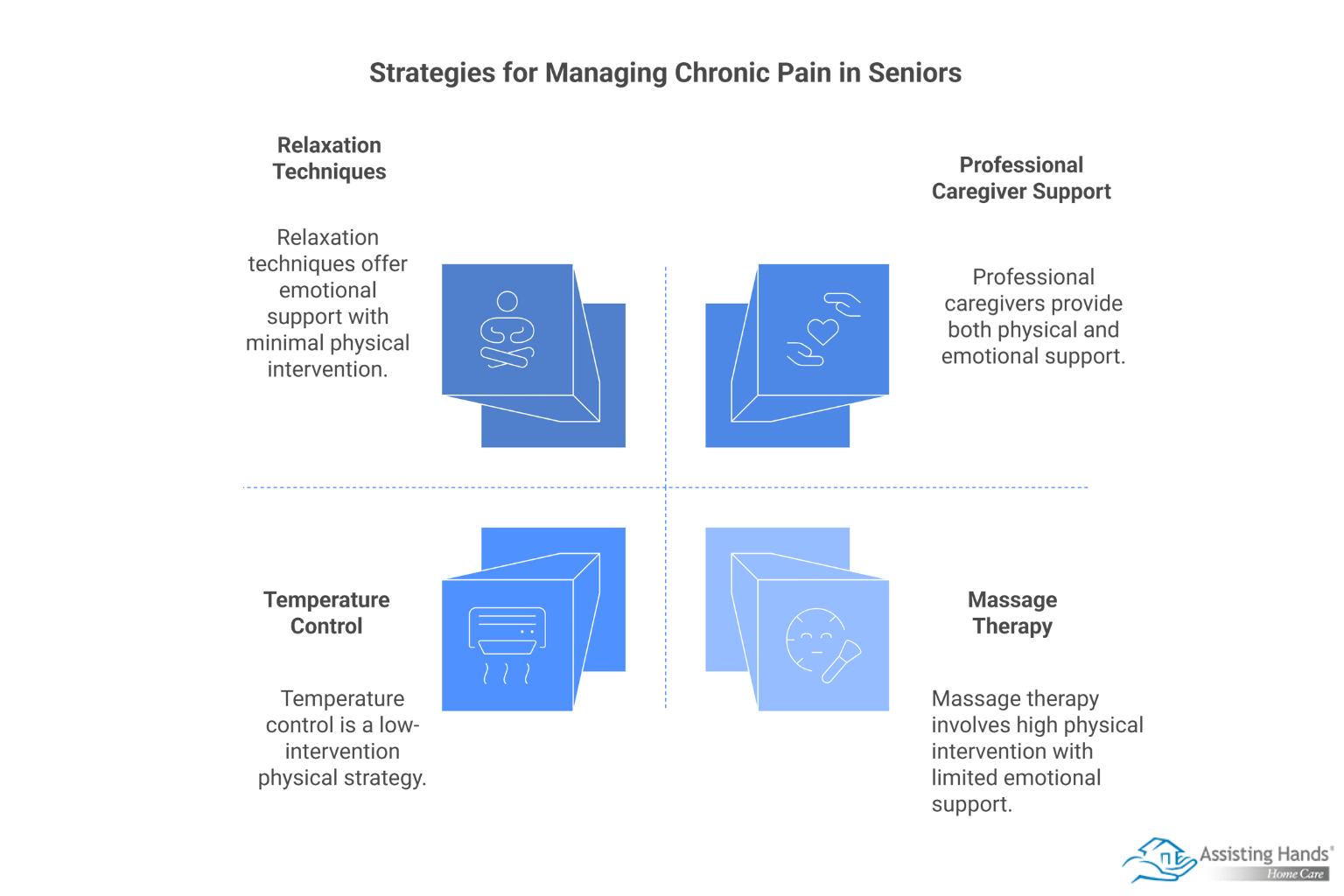
Table of Content
Chronic pain affects millions of seniors, creating daily challenges that extend far beyond physical discomfort. When caring for an aging loved one experiencing persistent pain, understanding effective comfort strategies becomes essential for maintaining his or her quality of life and emotional wellbeing.
Understand Chronic Pain in Seniors
Chronic pain in older adults differs significantly from acute pain episodes. Unlike temporary discomfort that resolves with healing, chronic pain persists for months or years, often stemming from conditions like arthritis, fibromyalgia, or neuropathy. This ongoing discomfort can affect sleep patterns, mood, appetite, and overall mobility.
Age-related changes in pain perception and medication metabolism mean seniors often require specialized approaches to pain management. Their bodies may process pain medications differently, and they’re more susceptible to side effects from traditional pain relievers. Additionally, chronic pain can contribute to depression, anxiety, and social isolation, making comprehensive care essential.
Family caregivers must recognize chronic pain is a legitimate medical condition requiring professional treatment. Dismissing pain complaints as “normal aging” can prevent seniors from receiving appropriate care and support. Understanding the complex nature of chronic pain helps caregivers provide more effective and compassionate assistance.
Hiring a professional caregiver is one of the best ways to help your parent address pain. If you have a senior loved one who needs help maintaining a high quality of life while aging in place, reach out to Assisting Hands Home Care, a leading provider of homecare Portland families can trust. Our caregivers help seniors focus on healthy lifestyle habits such as eating nutritious foods, exercising regularly, and maintaining strong social ties, and we offer mentally stimulating activities that can boost cognitive health and delay the onset of dementia.

Create a Comfortable Physical Environment
The physical environment plays a crucial role in managing chronic pain symptoms. Temperature control becomes particularly important, as many seniors with chronic pain experience increased sensitivity to hot or cold conditions. Maintaining consistent moderate temperatures can prevent pain flares triggered by weather changes or drafts.
Lighting modifications can significantly impact comfort levels. Bright, harsh lighting may trigger headaches or increase overall discomfort, while inadequate lighting can cause eye strain and contribute to falls. Installing adjustable lighting options allows seniors to customize their environments based on their current pain levels and needs.
Furniture arrangements should prioritize accessibility and comfort. Supportive seating with proper cushioning can reduce pressure on painful joints and muscles. Placing frequently used items within easy reach eliminates the need for painful stretching or bending movements. Consider installing grab bars in bathrooms and along hallways to provide stability and reduce fall risks.
Noise control often gets overlooked but can significantly affect pain perception. Excessive noise can increase stress levels and make pain feel more intense. Creating quiet spaces where seniors can rest and relax promotes better pain management and overall wellbeing.
Implement Non-Medication Pain Relief Strategies
Heat and cold therapy offer safe, effective options for managing chronic pain without relying solely on medications. Warm baths, heating pads, or warm compresses can relax tense muscles and increase circulation. Cold therapy using ice packs or cold compresses can reduce inflammation and numb sharp pain sensations.
Gentle movement and stretching exercises, when approved by healthcare providers, can help seniors maintain joint flexibility and reduce stiffness. Chair exercises, slow walks, or simple stretching routines can prevent muscles from becoming rigid while avoiding overexertion that might worsen pain symptoms.
Massage therapy provides another valuable tool for pain management. Professional massage therapists trained in working with seniors can reduce muscle tension and increase circulation. Even simple hand or foot massages from family members can provide comfort and human connection that supports emotional wellbeing.
Relaxation techniques such as deep breathing exercises, meditation, or guided imagery can help seniors manage the emotional aspects of chronic pain. These strategies don’t eliminate pain but can reduce anxiety and help individuals develop better coping mechanisms for managing persistent discomfort.
Support Emotional and Mental Wellbeing
Chronic pain often leads to feelings of frustration, helplessness, and depression. Acknowledging these emotional responses validates the senior’s experience and opens opportunities for meaningful support. Regular check-ins about emotional wellbeing demonstrate care and concern beyond just physical symptoms.
Maintaining social connections becomes crucial for seniors living with chronic pain. Isolation can worsen both physical and emotional symptoms, creating a cycle that’s difficult to break. Arranging visits from friends and family, facilitating phone calls, or exploring virtual social activities can combat loneliness and provide emotional support.
Encouraging participation in enjoyable activities, even if modifications are necessary, helps seniors maintain a sense of purpose and normalcy. Reading, listening to music, working on puzzles, or engaging in hobbies can provide mental stimulation and positive distractions from pain sensations.
Professional counseling or support groups specifically designed for individuals with chronic pain can provide valuable resources and coping strategies. These services help seniors process their emotions about living with persistent pain while learning from others who face similar challenges.
Not every senior has the same care needs, which means they don’t all need the same type of senior care. You can rely on Assisting Hands Home Care to provide an individualized care plan to meet your elderly loved one’s unique care needs. Our caregivers help seniors focus on healthy lifestyle habits, such as eating nutritious foods, exercising regularly, and maintaining strong social ties, and we offer mentally stimulating activities that can boost cognitive health and delay the onset of dementia.
Coordinate Professional Care and Treatment
Effective chronic pain management requires coordination among multiple healthcare providers. Primary care physicians, pain specialists, physical therapists, and other professionals each play important roles in comprehensive treatment plans. Caregivers can help by maintaining detailed records of pain levels, medication effects, and treatment responses.
Medication organization becomes particularly complex with chronic pain treatment. Seniors may require multiple medications with different dosing schedules, potential interactions, and side effects. Organizing pill dispensers, setting medication reminders, and monitoring for adverse reactions ensures safe and effective treatment.
Regular medical appointments allow healthcare providers to monitor pain levels, adjust treatments, and address new concerns. Caregivers can support these visits by preparing lists of questions, documenting changes in pain patterns, and advocating for their loved ones’ needs during appointments.
Alternative therapies such as acupuncture, chiropractic care, or physical therapy may complement traditional medical treatments. Discussing these options with healthcare providers ensures they’re safe and appropriate for the individual’s specific condition and overall health status.
Helping a senior loved one mitigate chronic pain can be a challenging task. Families who find it difficult to care for their aging loved ones without assistance can benefit greatly from professional respite care. Portland, OR, family caregivers who need a break from their caregiving duties can turn to Assisting Hands Home Care. Our caregivers can encourage your loved one to eat well, exercise regularly, get plenty of mental and social stimulation, and focus on other lifestyle factors that promote longevity. To create a customized in-home care plan for your loved one, call us today.
